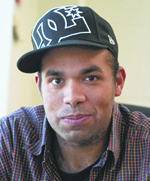Story by MITCHELL BROWN, for The Muleskinner—
 I promised myself that I would not succumb to Senioritis, a goal that’s easier said than done when going to class often feels like an uninspiring, grueling routine. But every now and then, while sitting in class, a spark of inspiration will hit like a bolt out of the blue. Sometimes it’s because I’ll find the course material riveting, and other times, it’s the way a particular professor teaches class, but it’s often a combination of both.
I promised myself that I would not succumb to Senioritis, a goal that’s easier said than done when going to class often feels like an uninspiring, grueling routine. But every now and then, while sitting in class, a spark of inspiration will hit like a bolt out of the blue. Sometimes it’s because I’ll find the course material riveting, and other times, it’s the way a particular professor teaches class, but it’s often a combination of both.
I recently had that feeling return while taking a political science course about the Israeli/Palestinian conflict taught by Khalil Marrar, a professor new to UCM. ( hired last semester.) To say he knows his stuff would be an understatement. One of the course’s required books is his work– entitled “The Arab Lobby and U.S. Foreign Policy: The Two State Solution.”
Dr. Marrar will often use video clips to illustrate lecture points. One of the clips he showed in class was of him being interviewed on a WGN news broadcast, which correlated with the lecture.
Watching a clip of my professor on a national news program while he was standing in the room was a surreal moment. Marrar is Palestinian by birth, so he is able to provide a first-hand perspective on the issue.
However, he said he wouldn’t use the class as a platform to promote his point of view on the conflict, but rather to provide an equal focus on Israeli and Palestinian views.
I think focusing on multiple views is the best way to teach the subject because of its complexity.
My knowledge of the subject is probably average. I’m aware of historical events like the Six Day War of 1967, the Yom Kippur War of 1973 and how the birth and growth of the Zionist movement was in response to the prevalence of anti-Semitisim throughout parts of Europe. I enrolled in the course to learn more about the intricacies of the conflict.
The content of the first lecture included information on the origins of the conflict, misconceptions about its origins and linguistic and cultural similarities between Jews and Palestinians.
I was in awe and felt reinvigorated about higher education after class let out, but I was also disheartened because only nine students had enrolled in the course. Why? Maybe because it’s a night class that’s almost three hours. But when I took history of Ancient Rome, a few semesters ago, in the same time-slot, the class had a packed house. This course also deserved one.
Most of the other students in the class were political science majors or minors. I was the only student from a journalistic background there. Dr. Marrar told me he was glad to see a journalism student on board. His opinion is that not enough journalists are well informed about the subject.
With that statement, he hit upon the reason I’m taking the class.–to further expand my base of knowledge. Although the course credits will not go towards either of my majors, taking the class does help the practice of my craft.
A good journalist should have a thorough base of knowledge regarding what he or she is covering. I’m not even going to speak about a topic I don’t have proper knowledge of, let alone write about it.
For a student-journalist who has an interest in political events, particularly those with an international bent, taking a political science course on the Israeli/Palestinian conflict is just as relevant and necessary as the earliest communication courses I took.


Leave a Reply